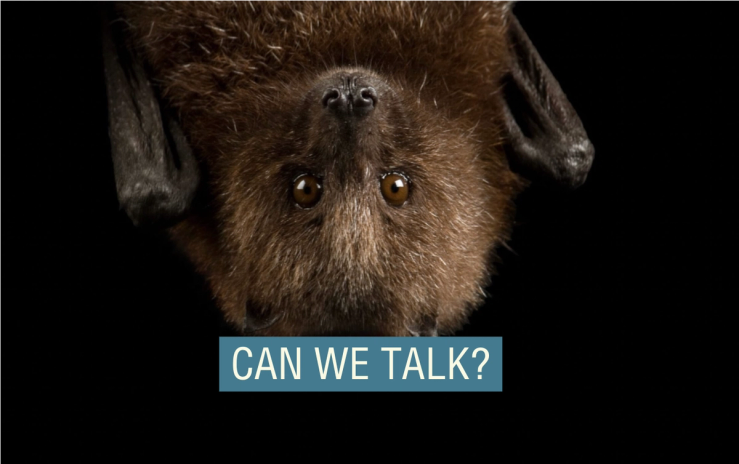The Scene
A British financier will pay millions to anyone who finds a way for humans to communicate with animals as part of a new generation of AI prizes that represent a fresh incentive to push technology forward.
Jeremy Coller, who made his money developing a way for a private equity fund’s backers to sell interests or assets to another investor, is offering $10 million to whoever can pass a kind of modified, interspecies Turing Test. The now archaic test examines whether machines can successfully imitate humans and trick them into believing that they’re chatting with another person.
The goal of the Coller Dolittle Challenge, instead, is to test whether humans can mimic animals and trick them into talking with humans. AI algorithms have helped analyze bat calls and whale songs, leading scientists to believe that communication with other species may be possible. Yossi Yovel, a professor at Tel Aviv University’s Sagol School of Neuroscience, who is chairing the competition, said it’ll be very difficult to show whether a human has successfully communicated with an animal, and that he’s still trying to finalize the competition’s rules.
“We want to decipher their communication system and we want to communicate with them using their communication system,” he told Semafor. “So training a dog to sit using human language does not count. If you can do it using barking, then that might be something else.”
The Coller Dolittle Challenge is one of a new set of efforts to drive developments in AI that are too weird for big companies, and too wild for academia. These types of contests are often driven by rich donors with niche, peculiar interests and a strong desire to change the world.
Yovel said Coller is “all for animal rights, which I think our competition is very relevant for because the more we understand animal cognition and communication, the better we will know how to treat them.” Singer Peter Gabriel, who was popular in the 1980s and ’90s, is also part of the effort as co-founder of the Interspecies Internet, a think tank dedicated to accelerating communication with animals and backed by Coller.
“When I played music with bonobo apes, I was stunned by their intelligence and their musicality,” Gabriel said on the Coller Dolittle Challenge website.
The winners of these AI contests often go from being unknown computer scientists to geeky rock stars. For example, the Vesuvius Challenge, launched by former GitHub CEO Nat Friedman and entrepreneur Daniel Gross, offered amateurs a path to fame and fortune in artificial intelligence.
Youssef Nader, a PhD student at Freie University, was part of the three-person team that won the $700,000 grand prize this year for deciphering the charred remains of ancient Greek scrolls. He is now famous among archaeologists.
“I met a lot of them, and all three of us sort of became celebrities in this field, of which we know nothing about,” he told Semafor. “[We] don’t know any Greek, but people assume we’re experts.”
He became captivated by the idea of downloading 2000-year-old data directly onto his laptop, and spent hours trying to figure out ways to piece together the characters in the scroll, sacrificing sleep.
These flashy million-dollar prizes offer an alternative way to solve quirky AI problems in new ways that push the technology forward outside the confines of academia and industry. Anyone with some technical chops can get involved.
“I think it’s a very interesting way of solving research problems that probably would otherwise be stalled,” Nader said.
In this article:
Know More
Now, Nader is thinking of entering the ARC Prize contest, for which Mike Knoop, the co-founder of Zapier, a software automation startup, has put up $1 million. The challenge was initially proposed by François Chollet, a software engineer and AI researcher at Google, in 2019 and involves solving a series of visual puzzles that are easy for humans to understand but difficult for AI.
The problems require applying pattern recognition and reasoning skills in novel scenarios. Knoop will award a grand prize of $500,000 if participants can train an AI model that can solve 85% of the problems, and believes that current transformer models like ChatGPT have limited intelligence. Even though their abilities have improved with scale, Knoop and Chollet are convinced they won’t lead to artificial general intelligence.
Companies like OpenAI and Anthropic, however, are betting that it’s inevitable they will eventually reach the holy grail of machine intelligence if they can keep training larger models.
“There’s an incentive for the entire ecosystem to heavily promote this since there’s a lot of money riding on the winners. It stamps out a lot of competition, but as a society, we need new ideas,” Knoop told Semafor.
He was motivated to launch the prize as a way to keep fundamental AI research open, since tech companies keep their technologies secret. “Right now the world″s bet is that these individual labs are going to solve [AGI] within themselves,” he said. “And yet, if you look at the history of AI, that’s not how any of it actually progressed.”
Katyanna’s view
Prizes incentivizing researchers to solve problems or reach scientific breakthroughs aren’t new. But the AI buzz seems to be attracting more wealthy people in tech and philanthropy to believe in wackier ideas that might not have been possible before. They cut through the bureaucratic fluff that bogs down academia and industry.
People don’t have to have fancy titles, apply for grant funding, or persuade executives for resources to work on a problem, which is a breath of fresh air. The benefits from solving it are shared publicly for other people to build upon, and even if the goals are niche, they still contribute to societal progress in some way. There’s no harm in trying to decode ancient text, and we would be better off if we could build generally intelligent machines or talk to animals one day.
Room for Disagreement
Cynics may argue that these types of contests won’t necessarily make much progress, and that the money should be spent tackling issues that are more helpful than reading burnt scrolls. Some believe that the ARC Prize, for example, isn’t a good test for developing AGI. Even if a developer invents a new algorithm that can successfully solve the puzzles, it might not be applicable to other domains that are actually useful like healthcare or science.
Notable
- Here’s a podcast interview with Knoop and Chollet on why they don’t believe LLMs will reach AGI.


